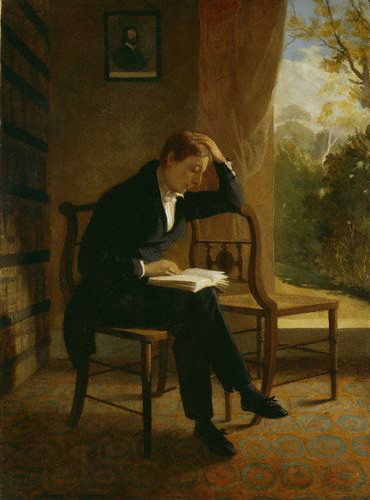A recent Page-Turner column in the on-line New Yorker touches on a subject that is close to my heart: “Reading through Someone Else’s Eyes.” Regular readers of this blog know that I talk constantly about the significance of how different readers respond to literature. In the New Yorker piece, author Brad Leithauser reflects upon the pleasures involved in doing so, which he finds to be even “more rewarding” than figuring out what an author was thinking:
But more complicated still—and, in some ways, more rewarding still—is the attempt to read a book through someone else’s eyes. Your thoughts triangulate. You wonder. What did person X feel when he read Y’s book.
It needn’t be a novel. Maybe it’s a collection of stories, poems, even essays. Someone you’re interested in—your person X—found this book entrancing. It’s no longer sufficient to know what the author was thinking. Now you want to know what person X thought the author was thinking.
Perhaps you read a book that you don’t much care for. Then you discover that some writer you adore, and with whom you feel psychologically aligned, loved it. So you open it once more, this time attempting to apprehend it through his eyes. “What did he see in it?” you ask yourself. The question provides a rhythmic march through its pages: What did he see? What did he see?
Leithauser cites a number of examples. For instance, Ovid, especially in the 1567 Arthur Golding translation, becomes especially interesting when one learns that he was a major influence on Shakespeare. Literary scholar Helen Vendler’s view of Milton changes when she reads him through the eyes of Keats, as signaled by the Romantic poet’s marked up version. Here’s Vendler:
To read Paradise Lost through Keats’s eyes is to see it in part as a poem of Shakespearean characterization, but chiefly as a poem of luxuriant and opulent description, full of growth, change, ripening, delectable sweets, and golden profusion.
And then there’s Leithauser reading the poetry of New Yorker poetry Howard Moss through the eyes of poet May Swenson, whose underlined copy of Moss’s poetry he just happens to own:
How would she ever have supposed that her dialogue with Moss would become a trialogue, in which another reader would materialize to question and puzzle over her annotations?
But the best part of Leithauser’s essay is imagining why his mother would have loved the Elsie Dinsmore books. In the process of exploring her affection for them, he understands more about her childhood.
Leithauser even finds himself trying to figure out who he himself was at an earlier age on the basis of some marginal notes he wrote:
Of course, it’s a highly conjectural, iffy business—trying to read through someone else’s eyes. Or even, I’d add, through one’s own. Given enough years between visits, rereading a book can feel startlingly alien. Recently, I opened a collection by a contemporary poet who had meant much to me in college. Here was a stanza beside which I’d written in the margin, in a penmanship larger and somehow more hopeful-looking than my present hand, “Brilliant!” I stared and stared at the passage, seeking to reawaken a distant excitement: What did he see in it? But I couldn’t. The moment would have been less unnerving, I suppose, if I’d scrutinized the passage and determined, with some comforting recourse to the superior discernment of age, that it was, in fact, clumsy or orotund or emptily romantic. But it seemed merely bland. I longed to get back into the head of that fervent undergraduate, to read sympathetically through his eyes. I was naturally quite interested in him, and approached him with good will, but for all his fervency he remained stubbornly aloof. In the end, he was a stranger.
Leithauser’s article got me thinking about why I myself am so fascinated by other readers reading, and I plan to write about this quite a lot in upcoming weeks. Here’s one theory:
Maybe I’m interested in other readers reading because it makes me feel part of a community. Unlike most of the kids around me, I spent my childhood immersed in books, and knowing that others were out there having intense experiences made me feel less weird. I admit to being a very impressionable person, one who likes to fit in, so when I heard about people having strong responses to works, it was as though I had been given permission to have strong responses.
That’s one possible explanation. More are on the way.


